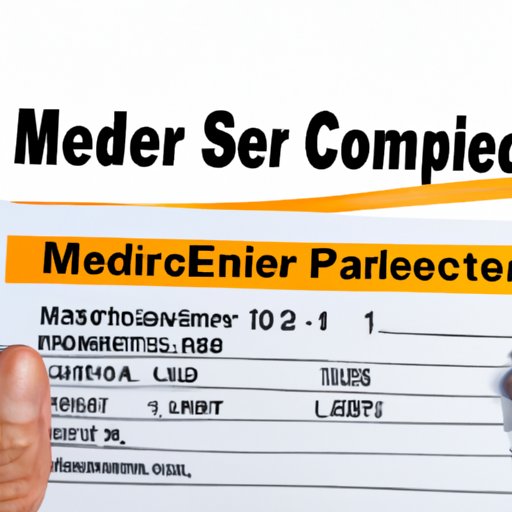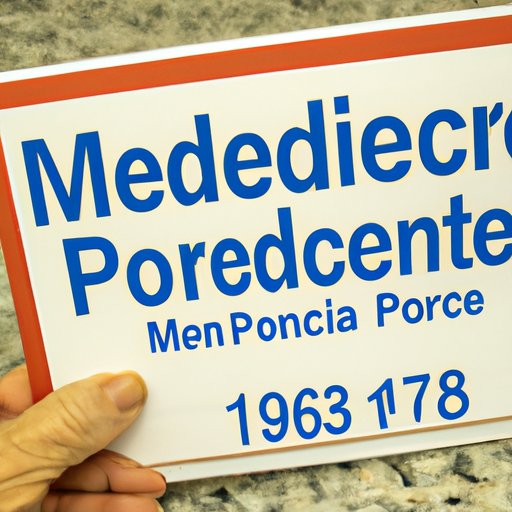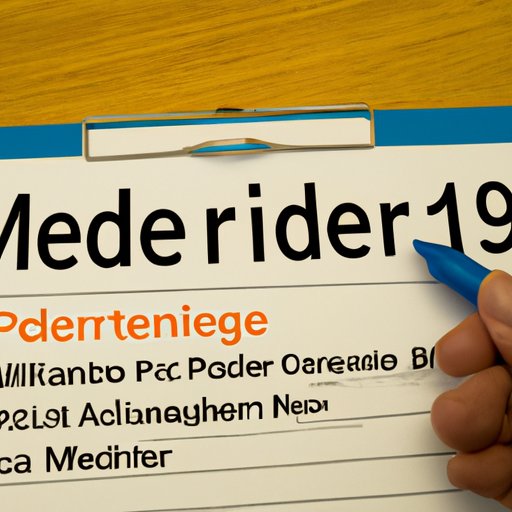Introduction
For healthcare providers who are looking to bill Medicare for services rendered, one of the most important pieces of information they need is their Medicare provider number. This is a unique identifier assigned to healthcare providers who have been approved to bill Medicare. This article will explore what a Medicare provider number is, how to obtain it, and the benefits of having a Medicare provider number.
Explaining the Basics of a Medicare Provider Number
At its core, a Medicare provider number is a unique identifier that is assigned to healthcare providers who have been approved to bill Medicare for services rendered. The provider number is usually a combination of nine numbers and letters, and it is used to identify the provider when billing Medicare.
According to the Centers for Medicare & Medicaid Services (CMS), “Any individual or organization that provides healthcare services and is approved by Medicare to bill for those services must have a Medicare provider number.” This includes physicians, hospitals, nursing homes, home health agencies, and other healthcare providers. In order to receive reimbursement from Medicare, providers must have a valid provider number.
When applying for a Medicare provider number, providers must provide certain information to CMS. This includes information about their practice, such as the name and address of the practice, the type of services provided, and the tax identification number. They must also provide information about the individual provider, such as their name, Social Security number, and National Provider Identifier (NPI).

How to Obtain a Medicare Provider Number
In order to obtain a Medicare provider number, healthcare providers must apply through CMS. The application process can be done online, and the application must be signed by the provider or their authorized representative. It is important to note that the provider must meet all eligibility requirements in order to be approved for a provider number.
When applying for a Medicare provider number, there are certain documents that must be submitted along with the application. These include documents such as proof of identity, proof of licensure, and proof of ownership of the practice. The documentation required will vary depending on the type of provider.
Once the application is received, it typically takes between two and four weeks to receive a provider number. During this time, CMS will review the application and determine if the provider meets all eligibility requirements.

The Benefits of Having a Medicare Provider Number
Once a provider has been issued a Medicare provider number, there are many benefits that come with it. One of the most important benefits is the ability to bill Medicare for services rendered. Providers can use their provider number to submit claims to Medicare, which can help streamline the billing process.
Having a Medicare provider number also provides access to resources that can help providers better understand the Medicare system and how to maximize their reimbursements. Additionally, providers can use their provider number to view claim status and payment information, as well as check their compliance status with Medicare.

Utilizing Your Medicare Provider Number
Once you have obtained a Medicare provider number, it is important to understand how to use it correctly. When submitting claims to Medicare, providers must include their provider number in the appropriate field. Additionally, when submitting claims electronically, providers must use their Electronic Data Interchange (EDI) number in order to ensure that the claim is processed correctly.
It is also important to keep records of all claims that are submitted with your provider number. This will help you track the progress of your claims and make sure that you are receiving proper reimbursement from Medicare.
Understanding the Different Types of Medicare Provider Numbers
There are two types of Medicare provider numbers: the National Provider Identifier (NPI) and the Unique Physician Identification Number (UPIN). The NPI is a 10-digit number that is assigned to healthcare providers who are enrolled in Medicare. The UPIN is a 6-character code that was formerly used to identify physicians, but is no longer used by Medicare.
The Significance of Keeping Your Medicare Provider Number Secure
It is important to keep your Medicare provider number secure at all times. Providers should never share their provider number with anyone, as it can be used for fraudulent purposes. Providers should also be aware of any suspicious activity involving their provider number and report it to Medicare immediately.
When submitting claims to Medicare, it is important to make sure that your information is kept secure. Providers should always use secure methods of communication when sending sensitive information, such as using encryption or a secure web portal.

What to Do if You Lose Your Medicare Provider Number
If a provider loses their Medicare provider number, they should contact Medicare as soon as possible. Medicare can help the provider obtain a new provider number and provide guidance on the steps that need to be taken to get a new provider number.
Conclusion
In conclusion, a Medicare provider number is an important identifier for healthcare providers who are looking to bill Medicare for services rendered. It is important for providers to understand the basics of a Medicare provider number, how to obtain one, and the benefits of having a Medicare provider number. Additionally, providers should take steps to keep their provider number secure, and contact Medicare if they lose their provider number.
Key Takeaways
- A Medicare provider number is a unique identifier that is assigned to healthcare providers who are approved to bill Medicare.
- Providers must meet all eligibility requirements in order to obtain a provider number.
- Having a Medicare provider number provides access to resources and allows providers to submit claims to Medicare.
- Providers should take steps to keep their provider number secure, and contact Medicare if they lose their provider number.
(Note: Is this article not meeting your expectations? Do you have knowledge or insights to share? Unlock new opportunities and expand your reach by joining our authors team. Click Registration to join us and share your expertise with our readers.)
